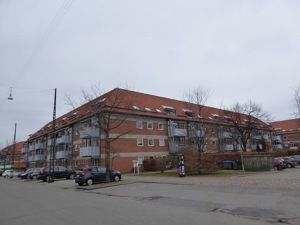News
International News in Brief: Swedish citizen jailed for shooting Danish teenager
This article is more than 7 years old.
In other stories, airlines in hot water over compensation payouts, a new air route to Ukraine is opening and a Danish rhino will soon be on its way to Africa

The shooting took place in front of the victim’s home in Ragnhildgade (photo: Leif Jørgensen)
Last October, a 16-year-old Copenhagener named Servet Abdija was shot six times at close range whilst playing football outside his Ragnhildgade home on the border between Østerbro and Nørrebro – a murder that police initially thought was a organised hit.
However, the dead boy also seemed to be quite ordinary, with no connections to criminality or the ongoing gang war that was raging at the time. Witnesses said they saw three men fleeing the scene of the crime.
A Balkan connection?
On Friday last week, an unnamed 34-year-old Swedish citizen of Yugoslavian origin was taken into custody suspected of Abdija’s murder, reports DR Nyheder. It turns out the Swede has a string of previous convictions – for attempted murder, burglary, GBH and driving with a false licence.
The breakthrough in the case came when police revealed they had found the weapons used in the killing but didn’t know enough about them. Further information led them to look towards Sweden, and an arrest followed.
Abdija’s family are of Macedonian and Albanian origin.
Airlines dragging their heels over compensation
Last Monday almost saw an airliner held back by bailiffs because the owner, the Spanish airline Vueling, had not paid compensation owed to Danish customers, reports TV2 Nyheder. Chasing the claims, of which one goes back five years, is the organisation flyforsinkelse.dk, which helps customers get compensation they are entitled to under EU law. The company has dealt with around 10,000 similar cases in its six-year existence. EU law states that passengers have a right to compensation if their plane is delayed by three hours or more. If the journey is under 1,500 km they are entitled to 1,865 kroner – an amount that then rises to 2,984 (1,501-3,500) and 4,476 (3,500+). Despite the law a number of cut-price and budget airlines just don’t pay up. “There ought to be no doubt at all regarding the rules. However, time and time again we see that airlines just don’t cough up,” said the deputy head of the Tænk consumer organisation, Vagn Jelsøe.
New air route to Ukraine
Next spring, Wizz Air intends to open a new route direct from Copenhagen Airport to the Ukrainian town of Lviv. This will be the third direct route to the country available from Kastrup. Lviv was founded in the 13th century and its historic centre is on UNESCO’s world heritage list. According to Copenhagen Airport’s commercial director Peter Krosgaard the new route will be good for business travellers as well as for tourists. “Over the last couple of years more and more Danish companies, for example in the IT sector, have expanded their activities in Ukraine, so now we can expect better connections,” he said. The first flight is expected to take place on 3 March 2019.
Danish-born rhino to be released in Africa
Mandela, a three-year-old black rhinoceros born in Ree Park Safari in Djursland, will shortly begin its journey to be released back into the wild, TV2 Nyheder reports. The rhino is going to be let out in Akagera National Park in Rwanda next July. The rhino’s presence is sorely needed as it is estimated that due to poaching there are only 5,000 left in their natural habitat. The park in Rwanda is well guarded and partly surrounded by an impenetrable swamp, so there is every chance that Mandela will thrive and pass on new genes to the flock. Mandela’s voyage starts in November with a first leg to a park in the Czech Republic, where he will stay for a couple of months with four other rhinos destined for Rwanda.










































